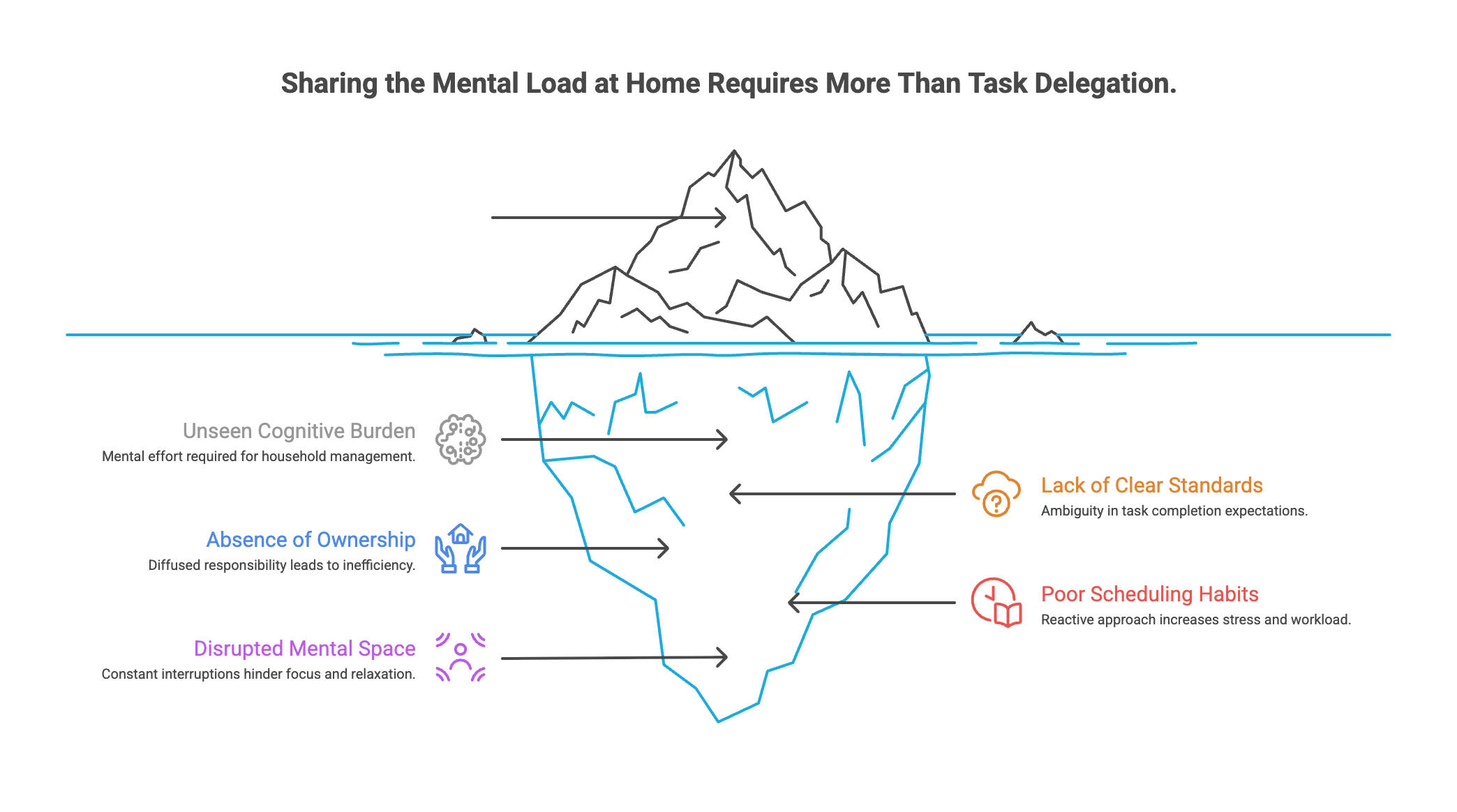Guide to Mental Load in DC
Mental load isn’t just doing household chores—it’s the thinking behind them. It’s the constant planning, anticipating, and monitoring work that runs in the background while you’re answering work emails, riding the Metro, or trying to fall asleep. In simple terms, mental load is the cognitive household labor that keeps home and family life moving.
What does “mental load” mean?
Mental load is the invisible layer of cognitive tasks—keeping track of the calendar, remembering to buy toilet paper, planning meals, noticing when the trash is full, and coordinating pickups and payments. Mentally managing household tasks includes keeping track of restocking needs, scheduling maintenance, and ensuring bills are paid. Because working memory has limits described by cognitive load theory, carrying too much at once can strain mood, focus, and decision‑making; sustained pressure can build allostatic load that affects both body and mind.
What does mental load feel like?
- Feeling tired, snappy, or numb
- Trouble concentrating or forgetting small things
- Worry looping at night; sleep not feeling restorative
- Less joy in hobbies or time with your partner/family
Ongoing or increasing mental load can lead to added stress, anxiety, and sleep deprivation.
These patterns mirror patient‑education research on working memory showing how overload crowds attention and recall.
Why does it build up in DC life?
Digital tools can elevate perceived mental workload—constant notifications, multi‑step portals, and endless to‑dos—documented in a review of digital health technologies. Add commutes, high‑stakes jobs, and caregiving, and it’s easy for one partner to end up with more cognitive labor on top of physical chores. Over time, the same strain shows up in a broad set of work‑related mental health factors.
How do you share the mental load at home?
Use this five‑step reset to make the invisible work visible—and fair.
- 1. Map the whole picture. List household domains: meals, supplies, bills, scheduling, kid logistics, pets, elder care. Structuring tasks in behavior‑change program design reduces cognitive burden.
- 2. Set a minimum standard. Agree on what “done” means (e.g., pantry staples stocked, lunches prepped on Sunday). This prevents re‑work and resentment.
- 3. Assign one owner per outcome. Move from delegating tasks to owning results. If you own “meals,” you plan, shop, and cook—or arrange takeout. Clear ownership reduces back‑and‑forth and additional mental load.
- 4. Put it on a schedule. Ten‑minute Sunday check‑ins keep shared responsibilities current and stop last‑minute scrambles.
- 5. Protect mental space. Silence non‑urgent notifications; batch messages; build household “office hours” so the home manager isn’t “on call” 24/7.
What helps right now? Quick resets
- Single‑task for 20 minutes. Pick one thing and finish it. Short bursts lower cognitive load.
- Externalize the swirl. Use a shared list or whiteboard so the plan lives on paper, not in one person’s head; external aids support working memory.
- Breaks are not a luxury. Brief rest improves performance and recovery.
- Boundaries with devices. Turn off push alerts for non‑essentials; check messages twice a day, a practice supported by a digital workload review.
- Use time intervals. Techniques such as the Pomodoro technique can help prevent mental fatigue and improve focus by using time intervals for work and breaks.
When should you consider therapy for mental load?
If the split feels unfair, or tensions spike each week, a few sessions can help you name the cognitive dimension of home life, set boundaries, and design a fair division of household labor. For some, individual therapy helps rebuild skills for focus, emotion regulation, and stress recovery; for others, a brief couples tune‑up aligns expectations and ownership.
The mental load can feel overwhelming, isolating, and deeply unfair, contributing to resentment and disconnection. At Therapy Group of DC in Dupont Circle, we help Washingtonians share the mental load, reduce stress, and protect time for what matters.
Frequently Asked Questions about Mental Load
What is the difference between mental load and mental labor?
Mental load refers to the invisible cognitive and emotional work involved in managing household life, such as planning, anticipating needs, and monitoring progress. Mental labor encompasses this mental load along with the physical execution of domestic work, highlighting both the thinking and doing aspects of household responsibilities.
How does cognitive household labor impact mental health?
Cognitive household labor, which includes anticipation and monitoring work, can lead to increased stress, burnout, and anxiety when unequally shared. Many women carry a disproportionate share of this invisible load, which negatively affects their mental health and relationship satisfaction.
Why is open communication important in sharing domestic responsibilities?
Open communication helps partners recognize the constant state of mental work involved in household management. Discussing tasks and emotional labor openly fosters understanding, allowing couples to become equal household partners and share the mental load more fairly.
How can emotional labor affect family life?
Emotional labor involves managing the feelings and experiences of family members, especially children, and is often intertwined with mental load. This ongoing emotional work can be exhausting and contribute to an imbalance in domestic labor if not acknowledged and shared.
What strategies can help reduce the invisible load of mental work?
Strategies include delegating tasks based on strengths, setting clear boundaries, practicing self care, and using organizational tools like the Fair Play system. These approaches help balance the anticipation and monitoring work, making household life more manageable for all involved.


